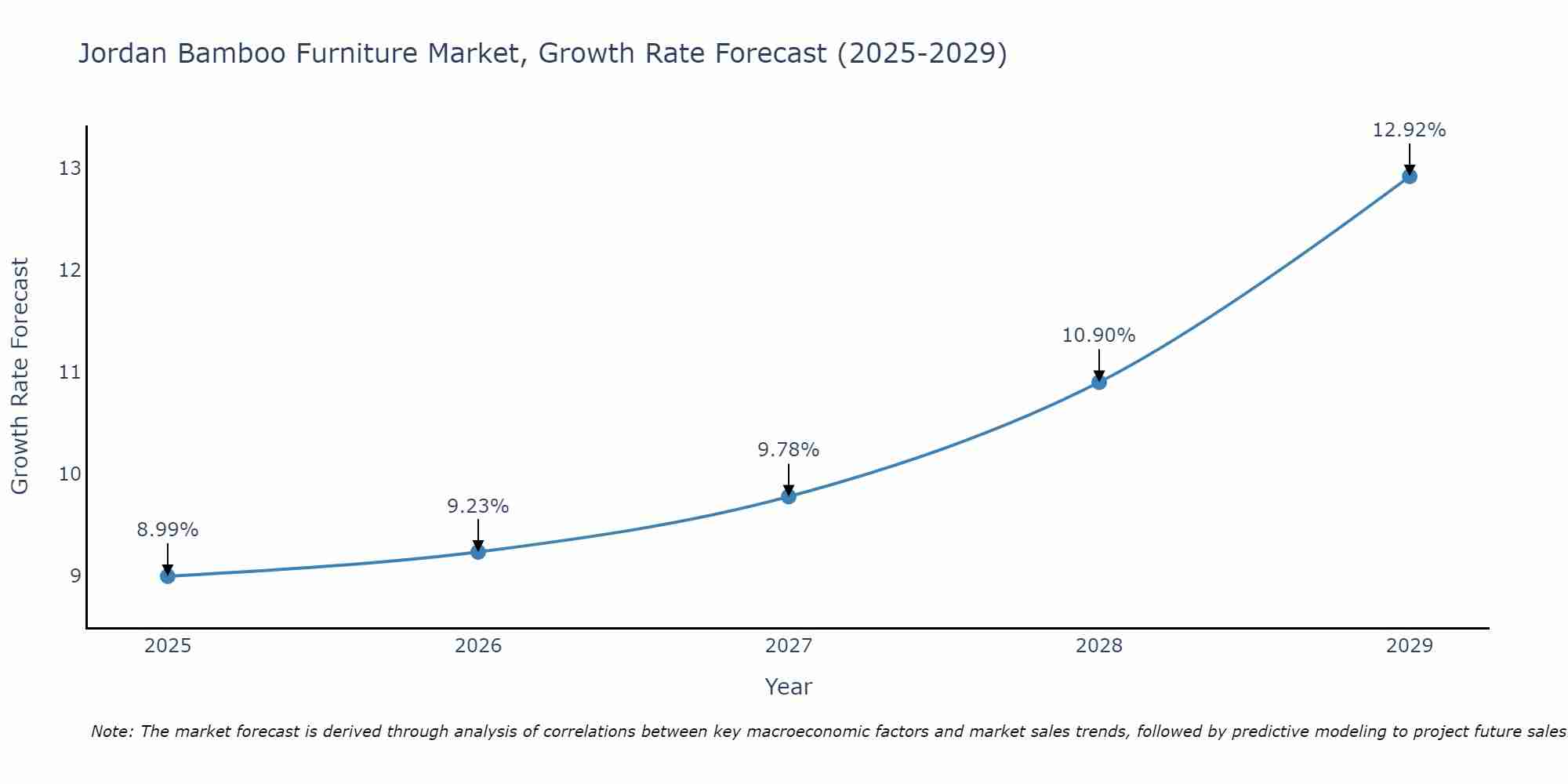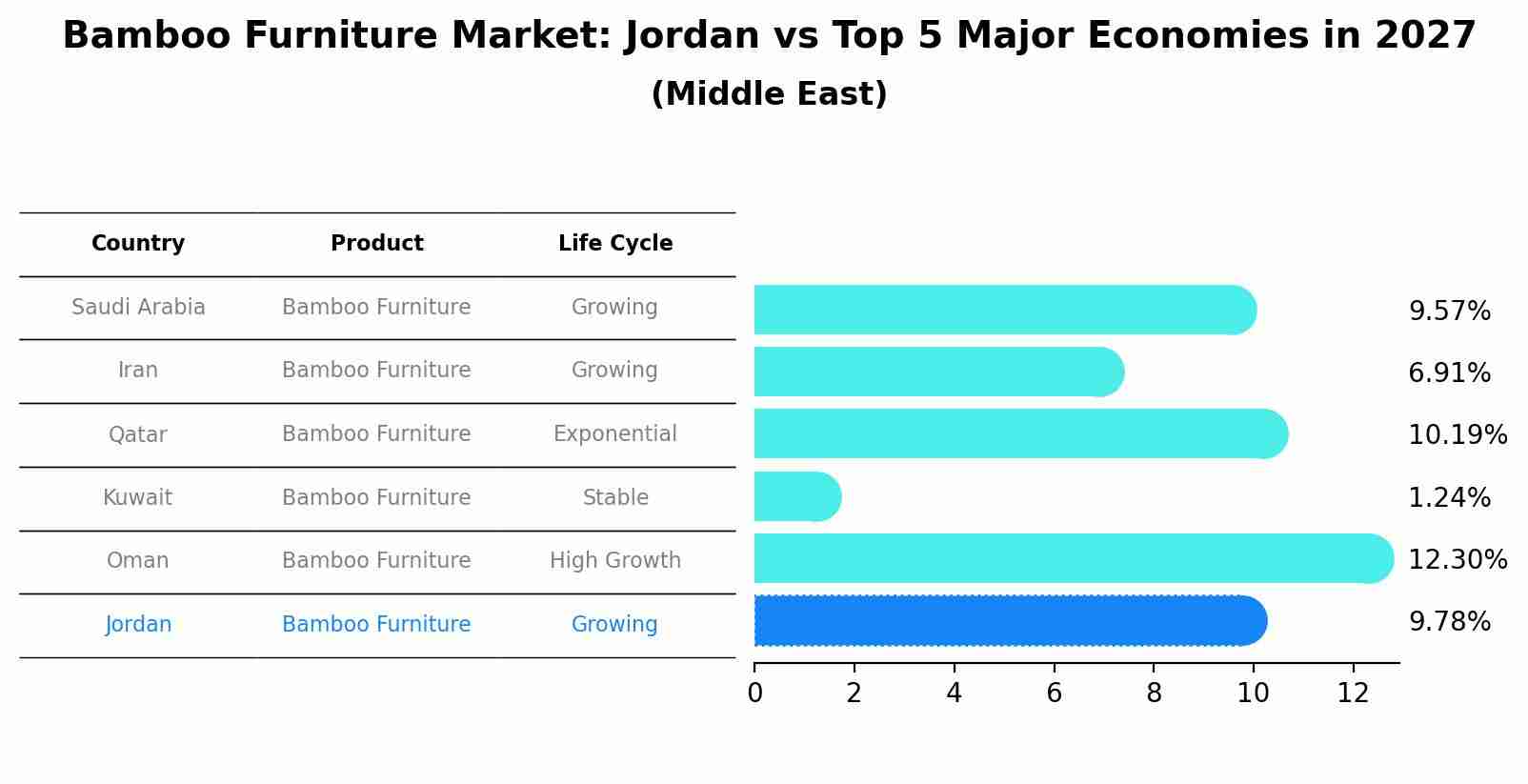Jordan Bamboo Furniture Market (2025-2031) Outlook | Growth, Value, Industry, Size, Analysis, Share, Companies, Trends, Revenue & Forecast
| Product Code: ETC370906 | Publication Date: Aug 2022 | Updated Date: Jul 2025 | Product Type: Market Research Report | |
| Publisher: 6Wresearch | Author: Bhawna Singh | No. of Pages: 75 | No. of Figures: 35 | No. of Tables: 20 |
Jordan Bamboo Furniture Market Size Growth Rate
The Jordan Bamboo Furniture Market is likely to experience consistent growth rate gains over the period 2025 to 2029. Commencing at 8.99% in 2025, growth builds up to 12.92% by 2029.

Bamboo Furniture Market: Jordan vs Top 5 Major Economies in 2027 (Middle East)
The Bamboo Furniture market in Jordan is projected to grow at a growing growth rate of 9.78% by 2027, within the Middle East region led by Saudi Arabia, along with other countries like Iran, Qatar, Kuwait and Oman, collectively shaping a dynamic and evolving market environment driven by innovation and increasing adoption of emerging technologies.

Jordan Bamboo Furniture Market Synopsis
The Jordan Bamboo Furniture Market is experiencing steady growth due to increasing consumer interest in sustainable and eco-friendly furniture options. Bamboo furniture is highly valued for its durability, versatility, and unique aesthetic appeal. The market is driven by a growing awareness of environmental issues and a shift towards more sustainable consumption practices. Key players in the market are focusing on innovative designs and high-quality craftsmanship to cater to the rising demand. The Jordanian market offers opportunities for both local artisans and international manufacturers to capitalize on the growing demand for bamboo furniture. With a focus on sustainability and quality, the Jordan Bamboo Furniture Market is poised for further expansion in the coming years.
Jordan Bamboo Furniture Market Trends
The Jordan Bamboo Furniture Market is currently experiencing a surge in demand due to the growing awareness of eco-friendly and sustainable products among consumers. Bamboo furniture is known for its durability, lightweight nature, and aesthetic appeal, making it a popular choice for modern home decor. In addition, the shift towards environmentally conscious purchasing decisions has led to an increased preference for bamboo furniture over traditional wood furniture. Manufacturers in the Jordan market are focusing on innovative designs, incorporating technology, and offering customization options to cater to the diverse preferences of consumers. As a result, the market is witnessing a steady growth trajectory with a promising outlook for the future as sustainability continues to be a key driving factor in consumer choices.
Jordan Bamboo Furniture Market Challenges
In the Jordan Bamboo Furniture Market, several challenges are faced, including limited awareness and acceptance of bamboo as a sustainable and eco-friendly material among consumers. Additionally, the lack of local bamboo resources and expertise in bamboo furniture craftsmanship pose hurdles for businesses operating in this market. Import restrictions and high transportation costs for bringing bamboo materials into Jordan further hinder the growth of the bamboo furniture industry. Moreover, competition from traditional furniture materials and the perception of bamboo furniture as inferior in quality or durability compared to hardwood furniture also present challenges for market players. Overcoming these obstacles will require targeted marketing campaigns to educate consumers, investments in developing local bamboo resources and expertise, as well as strategic partnerships to navigate import regulations and reduce costs.
Jordan Bamboo Furniture Market Investment Opportunities
In the Jordan Bamboo Furniture Market, there are several promising investment opportunities for both local and international investors. With the growing global trend towards sustainable and eco-friendly products, bamboo furniture presents a lucrative opportunity due to its renewable nature and environmentally friendly characteristics. Investing in manufacturing facilities for bamboo furniture production, establishing retail outlets or online platforms to market these products, and partnering with local artisans or craftsmen to create unique bamboo furniture pieces are all viable options. Additionally, there is potential for exporting Jordanian bamboo furniture to international markets, capitalizing on the increasing demand for sustainable furniture worldwide. Overall, the Jordan Bamboo Furniture Market offers a promising investment landscape with the potential for growth and profitability in the sustainable furniture industry.
Jordan Agar Market Government Policies
The Jordanian government has implemented various policies to support the bamboo furniture market in the country. These policies include providing financial incentives and subsidies to encourage bamboo furniture production, promoting sustainable practices in sourcing bamboo materials, and supporting research and development initiatives to improve the quality and design of bamboo furniture. Additionally, the government has put in place regulations to ensure the safety and durability of bamboo furniture products, as well as to promote fair trade practices within the industry. Overall, these policies aim to boost the growth of the bamboo furniture market in Jordan, enhance its competitiveness both domestically and internationally, and contribute to the country`s sustainable development goals.
Jordan Bamboo Furniture Market Future Outlook
The future outlook for the Jordan Bamboo Furniture Market appears promising as consumers increasingly prioritize sustainability and eco-friendly products. The demand for bamboo furniture is expected to rise due to its renewable nature, durability, and aesthetic appeal. Additionally, government initiatives promoting sustainable practices and the growing awareness of environmental issues are likely to further drive the market growth. With the global trend towards sustainable living, Jordan`s bamboo furniture market is poised for expansion, offering opportunities for manufacturers to innovate and cater to the evolving consumer preferences. However, challenges such as competition from traditional furniture materials and the need for effective marketing strategies to educate consumers about the benefits of bamboo furniture may need to be addressed to fully capitalize on the market potential.
Key Highlights of the Report:
- Jordan Bamboo Furniture Market Outlook
- Market Size of Jordan Bamboo Furniture Market, 2024
- Forecast of Jordan Bamboo Furniture Market, 2031
- Historical Data and Forecast of Jordan Bamboo Furniture Revenues & Volume for the Period 2021 - 2031
- Jordan Bamboo Furniture Market Trend Evolution
- Jordan Bamboo Furniture Market Drivers and Challenges
- Jordan Bamboo Furniture Price Trends
- Jordan Bamboo Furniture Porter's Five Forces
- Jordan Bamboo Furniture Industry Life Cycle
- Historical Data and Forecast of Jordan Bamboo Furniture Market Revenues & Volume By Type for the Period 2021 - 2031
- Historical Data and Forecast of Jordan Bamboo Furniture Market Revenues & Volume By Chairs & Tables for the Period 2021 - 2031
- Historical Data and Forecast of Jordan Bamboo Furniture Market Revenues & Volume By Stools for the Period 2021 - 2031
- Historical Data and Forecast of Jordan Bamboo Furniture Market Revenues & Volume By Beds for the Period 2021 - 2031
- Historical Data and Forecast of Jordan Bamboo Furniture Market Revenues & Volume By Others for the Period 2021 - 2031
- Historical Data and Forecast of Jordan Bamboo Furniture Market Revenues & Volume By End User for the Period 2021 - 2031
- Historical Data and Forecast of Jordan Bamboo Furniture Market Revenues & Volume By Residential for the Period 2021 - 2031
- Historical Data and Forecast of Jordan Bamboo Furniture Market Revenues & Volume By Commercial for the Period 2021 - 2031
- Jordan Bamboo Furniture Import Export Trade Statistics
- Market Opportunity Assessment By Type
- Market Opportunity Assessment By End User
- Jordan Bamboo Furniture Top Companies Market Share
- Jordan Bamboo Furniture Competitive Benchmarking By Technical and Operational Parameters
- Jordan Bamboo Furniture Company Profiles
- Jordan Bamboo Furniture Key Strategic Recommendations
Frequently Asked Questions About the Market Study (FAQs):
- Single User License$ 1,995
- Department License$ 2,400
- Site License$ 3,120
- Global License$ 3,795
Search
Related Reports
- ASEAN Bearings Market (2025-2031) | Strategy, Consumer Insights, Analysis, Investment Trends, Opportunities, Growth, Size, Share, Industry, Revenue, Segments, Value, Segmentation, Supply, Forecast, Restraints, Outlook, Competition, Drivers, Trends, Demand, Pricing Analysis, Competitive, Strategic Insights, Companies, Challenges
- Europe Flooring Market (2025-2031) | Outlook, Share, Industry, Trends, Forecast, Companies, Revenue, Size, Analysis, Growth & Value
- Saudi Arabia Manlift Market (2025-2031) | Outlook, Size, Growth, Trends, Companies, Industry, Revenue, Value, Share, Forecast & Analysis
- Uganda Excavator, Crane, and Wheel Loaders Market (2025-2031) | Strategy, Consumer Insights, Analysis, Investment Trends, Opportunities, Growth, Size, Share, Industry, Revenue, Segments, Value, Segmentation, Supply, Forecast, Restraints, Outlook, Competition, Drivers, Trends, Demand, Pricing Analysis, Competitive, Strategic Insights, Companies, Challenges
- Rwanda Excavator, Crane, and Wheel Loaders Market (2025-2031) | Strategy, Consumer Insights, Analysis, Investment Trends, Opportunities, Growth, Size, Share, Industry, Revenue, Segments, Value, Segmentation, Supply, Forecast, Restraints, Outlook, Competition, Drivers, Trends, Demand, Pricing Analysis, Competitive, Strategic Insights, Companies, Challenges
- Kenya Excavator, Crane, and Wheel Loaders Market (2025-2031) | Strategy, Consumer Insights, Analysis, Investment Trends, Opportunities, Growth, Size, Share, Industry, Revenue, Segments, Value, Segmentation, Supply, Forecast, Restraints, Outlook, Competition, Drivers, Trends, Demand, Pricing Analysis, Competitive, Strategic Insights, Companies, Challenges
- Angola Excavator, Crane, and Wheel Loaders Market (2025-2031) | Strategy, Consumer Insights, Analysis, Investment Trends, Opportunities, Growth, Size, Share, Industry, Revenue, Segments, Value, Segmentation, Supply, Forecast, Restraints, Outlook, Competition, Drivers, Trends, Demand, Pricing Analysis, Competitive, Strategic Insights, Companies, Challenges
- Israel Intelligent Transport System Market (2025-2031) | Strategy, Consumer Insights, Analysis, Investment Trends, Opportunities, Growth, Size, Share, Industry, Revenue, Segments, Value, Segmentation, Supply, Forecast, Restraints, Outlook, Competition, Drivers, Trends, Demand, Pricing Analysis, Competitive, Strategic Insights, Companies, Challenges
- Uganda Precast and Aggregate Market (2025-2031) | Strategy, Consumer Insights, Analysis, Investment Trends, Opportunities, Growth, Size, Share, Industry, Revenue, Segments, Value, Segmentation, Supply, Forecast, Restraints, Outlook, Competition, Drivers, Trends, Demand, Pricing Analysis, Competitive, Strategic Insights, Companies, Challenges
- Australia IT Asset Disposal Market (2025-2031) | Strategy, Consumer Insights, Analysis, Investment Trends, Opportunities, Growth, Size, Share, Industry, Revenue, Segments, Value, Segmentation, Supply, Forecast, Restraints, Outlook, Competition, Drivers, Trends, Demand, Pricing Analysis, Competitive, Strategic Insights, Companies, Challenges
Industry Events and Analyst Meet
Our Clients
Whitepaper
- Middle East & Africa Commercial Security Market Click here to view more.
- Middle East & Africa Fire Safety Systems & Equipment Market Click here to view more.
- GCC Drone Market Click here to view more.
- Middle East Lighting Fixture Market Click here to view more.
- GCC Physical & Perimeter Security Market Click here to view more.
6WResearch In News
- Doha a strategic location for EV manufacturing hub: IPA Qatar
- Demand for luxury TVs surging in the GCC, says Samsung
- Empowering Growth: The Thriving Journey of Bangladesh’s Cable Industry
- Demand for luxury TVs surging in the GCC, says Samsung
- Video call with a traditional healer? Once unthinkable, it’s now common in South Africa
- Intelligent Buildings To Smooth GCC’s Path To Net Zero













